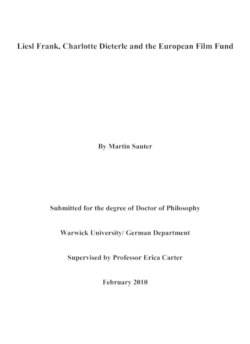Читать книгу Liesl Frank, Charlotte Dieterle and the European Film Fund - Martin Sauter - Страница 5
На сайте Литреса книга снята с продажи.
Chapter One Introduction
ОглавлениеUntil 1989, when the Stiftung Deutsche Kinemathek in Berlin, now the Deutsche Kinemathek, acquired the Paul Kohner Archive, the story of the European Film Fund was shrouded in mystery. Though references to the EFF in the then nascent field of exile research were numerous, researchers were confronted with a lack of empirical data and thus had to rely on secondary sources to research what this thesis will argue was a highly significant organisation in the history of film exile. These sources - biographies and autobiographies - tended to be vague or anecdotal in their allusions to the EFF. Referring to the sketchy picture that existed of the EFF, E. Bond Johnson, one of the first scholars to conduct research on the EFF in 1976, quoted Paul Kohner’s brother, Frederick, as commenting that, ‘the only way to write about the Fund is in a sort of Rashomon1 - that’s how multifarious the accounts and opinions were when he began his research on this part of his brother’s activity’ (Bond Johnson in Spalek & Strelka 1976: 136). In 1975, Marta Feuchtwanger, in her oral history with Lawrence Weschler,2 had already said that ‘... there was this foundation which is called European Film Fund, which was founded by Lisl [sic] Frank [...] and Charlotte Dieterle [...].What I should stress also was that the whole film people did so much for it [......]. Nobody ever speaks about it; I’m always upset that they have no more recognition’.3 The relative wealth of archival data now available on the EFF, has spawned surprisingly few investigations of this particular organisation, or indeed of similar organisations that sprang up as a result of the exile experience. To date, the most coherent account of the EFF can be found in H.G. Asper’s seminal Etwas besseres als den Tod ..., but since Asper’s intention was not to furnish a scholarly study of the organisation, his chapter on the EFF is factual and anecdotal rather than analytical. However, Asper’s pioneering account served as an inspiration for me to embark on my own investigation of this organisation.
My thesis sets out, by contrast, to breathe new life into our perception of the EFF by providing its definitive history. To this end, I have drawn extensively on archival sources. Those sources will be discussed at greater length at the end of this chapter. However, the EFF must also be seen as one case study within a lager historiography of exile in Hollywood. This thesis begins therefore with a review of that historiography, which can be broadly classified under three headings: early histories of exile in Hollywood and the United States, autobiographies and biographies, and studies on film exile. I refer in the body of this thesis to the wide range of literature on American film history I have consulted, as well as works on the contemporary politics of the 1930s and 40s that provide a conceptual and contextual framework for my investigation, enabling me to put the EFF - its founding and its operations - into a political and sociological perspective.4
